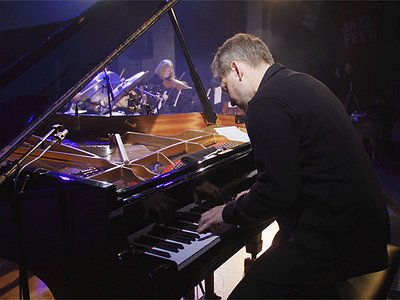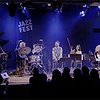Part 1
Name: Espen Berg
Occupation: Pianist, composer, improviser
Nationality: Norwegian
Current release: Espen Berg's Water Fabric is out via Odin. It features a band composed of Hayden Powell, Per Oddvar Johansen, Harpreet Bansal, Ellie Mäkelä, and Joakim Munkner.
Recommendations: Keith Jarrett - Sun Bear Concerts (Live); Sting - Ten Summoner’s Tales
If you enjoyed this Espen Berg interview and would like to stay up to date on his music and current live dates, visit his official homepage. He is also on Instagram, Facebook, and twitter.
Do you think that some of your earliest musical experiences planted a seed for your interest in improvisation?
Definitely. I remember spending much time as a child by the piano playing with chords and melodies, and listening to the overtones and the interference they create on unison piano strings.
I started composing music at the age of six and improvisation has always been the main resource and starting point for my music.
When did you first consciously start getting interested in musical improvisation? Which artists, teachers, albums or performances involving prominent use of improvisation captured your imagination in the beginning?
I didn’t really know of the term ‘improvisation’ until I started formal musical training at the age of 16. Up until that point I had spent a lot of time in my father’s home studio creating music following my intuition, and imitating songs that I liked.
At high school I was assigned with lessons in jazz piano, which honestly made me quite skeptical at first. I didn’t know anything about jazz, and I would’ve preferred pop, rock or something like that. I’m glad I didn’t change it, because the lessons I got from Helge Lien changed me instead. He threw me straight into free improvisation, and I was confronted with the notion of not knowing what to do and what to play.
[Read our Helge Lien interview]
A few years later, a fellow student on the jazz department at the university in Trondheim introduced me to the Köln Concert by Keith Jarrett. I instantly fell in love with it as it had a kind of presence I’d never heard on any other recording. But it was the very idea and the concept itself that really got me hooked.
I have always enjoyed challenging myself, and this felt like the ultimate challenge. I wanted to find out if I could do the same as Jarrett.
At that time my father had bought a new grand piano back home in Hamar where I grew up. I spent a few hours by the piano and recorded a lot of improvised music using a pair of good microphones. When listening back to it I could hear a potential, but I lacked so many tools in order to keep the music flowing. At this point I knew I had to dedicate myself, and I believed that someday I would be able to connect my inner ear with the instrument in the way required to convey my musical ideas through the piano in an instant.
After I discovered Jarrett’s solo concerts I started to look for similar projects. I checked out the solo works of the Danish pianist Carsten Dahl (Solo / Copenhagen - Aarhus and Solo piano), some of the music by Cecil Taylor and Marilyn Crispell, and later on also Brad Mehldau (10 Years Solo Live).
Just recently, I have listened a lot to Craig Taborn’s fabulous solo albums, Avenging Angels and Shadow Plays.
Tell me about your instrument and/or tools, please. What made you seek it out, what makes it “your” instrument, and what are some of the most important aspects of playing it?
I don’t really know exactly when I started playing the piano. My parents used to place me on the piano stool before I could even walk. It has always been my main instrument and the one where I feel that I can express everything I want to.
The huge advantages of the piano are the range, the ability to play with two hands and all ten fingers, and the flexibility when it comes to chords and voicings. And it’s basically a percussion instrument and serves as the perfect companion if you’re into rhythm, like me.
[Read our feature on the piano]
How would you describe your own relationship with your instrument – is it an extension of your self/body, a partner and companion, a creative catalyst, a challenge to be overcome, something else entirely?
It’s an instrument for my creative mind and my deepest emotions. As a pianist I have to deal with a different instrument at every venue. I’m fortunate to play concerts on mostly good, newly tuned pianos, but whenever that’s not the case I have to adjust myself in order to get the best out of it. I have taught myself how to tune the piano for when it’s necessary, but it’s quite exhausting doing that and playing the concert afterwards.
After two decades of touring and recording I have learned what to expect from my instrument in order to leave nothing in the way of my musical imagination. I’m happy to have been accepted as a Steinway Artist recently, as Steinway & Sons are the producer of my favorite instruments. With a good piano at hand, I can focus on creating music and immerse myself, instead of having to struggle with the instrument.
Although, I wouldn’t completely rule out all the quirkiness and the special occasions where a sub-par piano encourages me to think differently.
Derek Bailey defined improvising as the search for material which is endlessly transformable. What kind of materials have turned to be particularly transformable and stimulating for you?
Improvising is like diving into the unknown. It’s about discovering. Discovering music and also emotions.
I think the intertwined relationship between emotions and improvised music is what stimulates me the most and keep me going. Whenever I start improvising freely it’s like setting my mind free. It’s uncovering my thoughts and feelings, and in this way it has also helped me through a lot of difficult times.
It’s when I improvise that I connect the most with the music and my feelings. I play whatever feels most important to me in that very moment, and when improvising I also have the feeling that I can play forever. I would love to try it out sometime: Continue a solo concert until I’m physically in a state where I have to stop.
Usually I play for an hour or two, but up until now I’ve never stopped because I’m exhausted. Improvising gives me energy and joy, and keeps me curious.
Do you feel as though there are at least elements of composition and improvisation which are entirely unique to each? Based on your own work or maybe performances or recordings by other artists, do you feel that there are results which could only have happened through one of them?
Even though I like to blur the lines, I still view composing and improvising as two closely related, but different processes. I discover new music through both, feed my compositional skills with improvised music and vice versa.
The main thing that sets them apart is time: Improvisation is creating music in realtime, and composition is basically improvisation in slow motion. I think that's someone else’s words? It’s easier to construct and design when you have time to contemplate.
An improvised concert is a journey happening only at that exact place and time, and it can’t be repeated perfectly without losing it’s presence and power - because it’s a product of that specific moment. On the other hand, only recorded and written music have the ability to develop a long-term relationship with the listener.
When I improvise I try to tell a story in the same way as composed music, so I have to create, memorize and play around with recognizable musical elements in order to build up expectations and to create form.
Even though I have transcribed a huge amount of music, I have never transcribed a complete solo in detail. I can’t see the point of repeating a story that has already been told. Instead, I break it down to pieces to look at the techniques, mechanisms and the underlying process, to learn how to create a similar story.
It’s like learning a language by listening, and talking. Not just repeating it blindly without understanding.
When you're improvising, does it actually feel like you're inventing something on the spot – or are you inventively re-arranging patterns from preparations, practise or previous performances? What balance is there between forgetting and remembering in your work?
A good question, and something I care about every day. I wouldn’t keep on doing this if it wasn’t for the very fact that I feel that I’m creating new music on the spot. It’s what makes it so deeply inspiring for me. I take advantage of a musical language that I have learned over time, and I’m continuously expanding my vocabulary.
My main practice routine for the last 20 years has been improvisation. It’s basically a constant flow of ideas, and it flows in all directions. I grab a hold on certain movements along the way and work with them to improve my playing, to learn about and to get deeper into that specific element or style. I try to anchor all my knowledge of music in my inner ear through experience and practice lead research. I think this is especially important when improvising with traditional musical elements and styles. One advantage of having a skilled ear and perfect pitch when improvising is the ability to predict the outcome simultaneously or a few milliseconds before pressing down the keys.
I think it’s impossible to be innovative all the time, and I don’t think that’s relevant either. Keeping the music fresh and new doesn’t mean that it has to be disconnected from everything I have created or played in the past. It’s a development and a continuous process. I don’t mind repeating myself to a certain degree, and I think repetition is particularly helpful when it comes to defining a musical signature.
I love to hear when people say that they can recognize my music in an instant.






